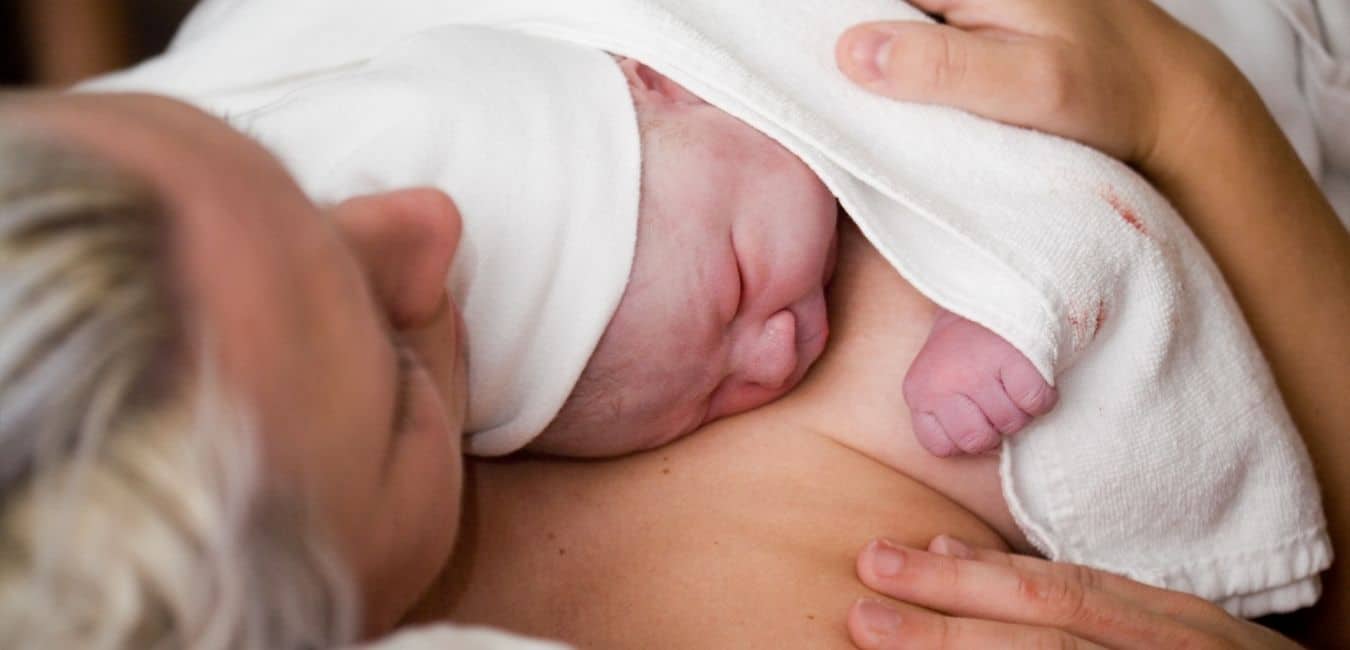Skin-to-skin is exactly what it sounds like – you and your baby having a cuddle with no clothes or blankets between you. This is sometimes referred to as “kangaroo care” as it resembles how kangaroos look after their newborn young in their pouch until they’re more mature. This practice is especially great during the Fourth Trimester (the first 3 months of your baby’s life) when your baby is trying to adjust to life outside of the womb. The human touch reassures your baby that they are safe and cared for while having a host of physical benefits too.
Benefits of skin-to-skin contact
- Releases hormones that relieve stress and stabilise baby’s temperature, breathing rate, heart rate, and blood sugar
- Helps baby gain weight faster as their energy is not used up trying to stabilise their body
- Helps baby feel less stress from being born
- Helps your baby adjust to life outside of the womb
- Gives baby good bacteria to protect against infection
- Improves baby’s absorption of nutrients
- Relaxes parent and baby
- Baby cries less because they feel secure
- Helps the mother heal after birth
- Helps the mother’s colostrum to flow more easily
- Helps the mother’s breastmilk come in
- Boosts mother’s breastmilk supply
- Boosts baby’s immune system and helps them to fight off infection
- Lowers risks of postpartum depression and anxiety
- Better communication between baby and parents as parents learn to recognise baby’s cues
- May improve baby’s brain development
- Your baby has a deeper sleep, further helping with growth
- May reduce mother’s postpartum bleeding
Additional benefits for babies in Neonatal Intensive Care
- Improved oxygen saturation
- Feeling your breathing helps them regulate their own breathing
- Improved blood flow to their brain
- Improved heart function
- Reduces stress levels which promotes healing
- Encourages feeding habits (suckling, rooting etc) to kick in
- Improves growth and weight gain
- Skin-to-skin with mother boosts breastmilk allowing her to pump more for her baby
- Mother’s breastmilk will adjust to the baby’s needs and produce appropriate antibodies
- May shorten hospital stay

Skin-to-skin immediately after birth
Whenever possible, a baby should be placed on their mother’s chest after birth and left there undisturbed for at least one hour (sometimes called the Golden Hour). During this hour the baby is comforted by their mother’s smell and the familiar sound of her voice. The mother is comforted by having her baby close, similar to how she has carried them for the last 9 months. Skin-to-skin contact in the first hours of the baby’s life is especially important for mother’s who intend to breastfeed. The baby will instinctively seek out their mother’s nipple for their first feed. Allowing the breastfeeding journey to begin in such a natural way has been associated with fewer breastfeeding problems, breastfeeding for longer and better bonding between mother and baby.
Immediate skin-to-skin is standard practice in many Irish maternity hospitals. Check with your midwife to see what is the standard practice in your chosen maternity unit.
How to do skin-to-skin
Remove all of your baby’s clothing except their nappy. They could wear a hat for extra warmth.
Place them on your bare chest, ensuring their head, neck and back are in a straight line and are well-supported.
Put a blanket over you both to stay warm.
Sit like this for at least 20 minutes so you and your baby get maximum benefit.
Do not do skin-to-skin when you are feeling sick or weak.
Avoid perfumes and other strong scents on your skin that may overwhelm your baby or irritate their sensitive skin.
Avoid smoking for at least 1 hour before skin-to-skin contact.
Do not do skin-to-skin under the influence of alcohol, drugs or when you’re extremely tired to avoid the risk of dropping your baby.
Skin-to-skin contact for dads
Skin-to-skin is great for dads to bond with their babies. Your baby gets the physical benefits and emotional comfort from being so close with a caregiver, while dad gets precious uninterrupted bonding time with their new baby. Bonding in this way has been shown to reduce the stress and anxiety associated with being a new parent and encourage more patient and gentle parenting practices.







